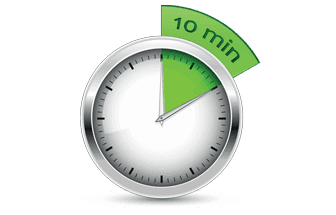SEO for your WordPress website – In 10 minutes
There is a lot to know about optimising your WordPress website to rank higher in search engines but it does not have to be overwhelming - get started here with the absolute basics.

Small business websites are hard work for their owners, often all the passion and drive is there to create something brilliant but it’s crippled by lack of time. Like any marketing activity, running a great business web site is second to… actually running the business. We write regularly about SEO and WordPress but often these posts assume some previous knowledge.
So today’s blog post is for the small business website owner, perhaps just starting out with a new WordPress website. You give me 10 minutes and I’ll give you a crash course in Search Engine Optimisation, specifically for WordPress. Over the 10 minutes I’m going to start out really basic but stick with me because even if you know a little you will learn something!
Start the stop watch!
The really basic basics
Search Engine Optimisation (SEO) is the art of making your website optimised so that it comes up when people search for it on sites like Google. Google and other search engines ‘index’ your site, they have computers that read your website and store loads of information about what they find.
Quick Fact: Search engines can only read text, not images or flash animations – simple text on the page.
If you are a butcher in Dee Why and you think that someone will find you by searching for ‘butcher in Dee Why’ they will only find you if that text appears in your website. If that text is prominent in your website (i.e. it appears in the right places in multiple places) even better.
Obviously there is going to be more than one website with the phrase ‘butcher in Dee Why’, so Google and the like employ very complex algorithms to determine which website comes up at the top of the results.
Focused content
Try to make each individual page of content focused on a particular subject. This is why blogging (see below in Regular content) is such a good idea to help with SEO. Having each individual page of content focused on a narrow subject helps the search engine understand what the page is about, the engines are smart they understand a lot about context.
Quick Fact: Rather than one page listing all of your services, make a page specific to each one, each page will be a lot more focused in the eyes of the search engine.
Focus also on a small group of keywords. It’s a good discipline to write them down. Between 10 and 15 phrases that you’re going to focus your content around. Yes there is an art to this keyword research but in its most simplistic form: phrases that users are going to use to search for and find your website. Then when you add new content to your site continually use and augment the density of these keywords.
Regular content
Consider this situation. Google sees two websites that are have ‘butcher in Dee Why’ in text on the page. One is a small 6 page web site that never changes and the other is a larger site, currently consisting of around 25 pages with 3 new pages appearing every month. On the second site the phrase ‘butcher in Dee Why’ appears in many of the pages in many different ways.
Which site do you think Google will rank higher in the results?
The answer is obvious, the second site. It is well recognised in the world of SEO that regular, fresh, relevant content will out rank static, stale and unchanged content. It’s a fact.
Many website owners struggle with this one “What would I write about”, “I don’t have time to add new content”. I’m yet to find a business or topic where I’ve not been able to suggest at least a handful of subjects to write about, off the top of my head. Let’s take our butcher example.
Here are 3 ideas for blog post topics:
- “How to pick the freshest product when visiting your local butcher”
- “Dee Why butcher specials this week”
- “3 recipes for cutlets that you’ve probably never tried”
See how easy it is?
Quick Fact: WordPress is one of the easiest website tools to use, adding content to your site is absolutely simple and straight forward.
Structured content
So you have a list of keywords and you’re adding content to your website regularly, now where you put the keywords is important. Again let’s keep things simple, we don’t have many of our 10 minutes left right? Google needs to work out which sites are more relevant so it will think like this: “If the heading that I’m seeing on site X has ‘butcher in Dee Why’ in it, then I think that’s more relevant than when the text appears just in a paragraph”. Or perhaps “If the title of this particular page is ‘Joe Soap – your local butcher in Dee Why’ then that whole page must be about the topic, yes it’s more relevant, rank it higher”.
Quick Fact: WordPress and theme frameworks like Genesis provide all the tools to control page structure (things like titles and page descriptions)
Of all the topics in this post, structure is probably the one that requires a bit of know-how. Refer to an older blog post WordPress SEO for the Genesis theme for some more information on this one.
What else do you need to know?
Ok, it’s true there is a lot more to SEO than what is presented here but in reality I don’t think any of it matters unless you’ve got these basic principles in place.
Depending on your speed of reading you’ve probably got at least 3 or 4 minutes left.
Scan these two posts now or bookmark them to read later:
I hope these ideas help. If you’ve gone to the trouble of building a website do yourself a favour and make the most of it by nurturing it and building upon it – the rewards will come!

Reader Interactions